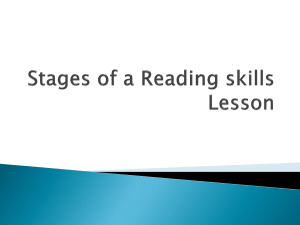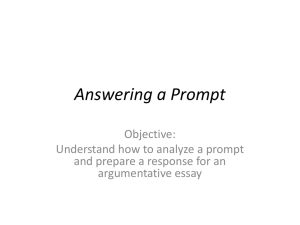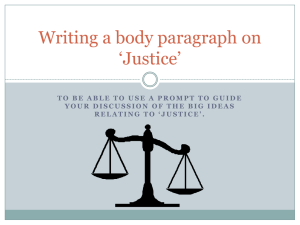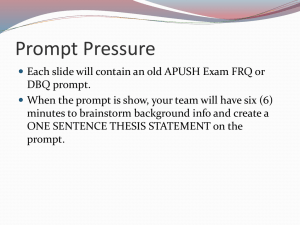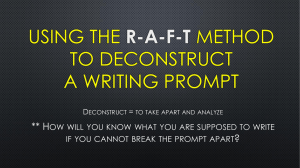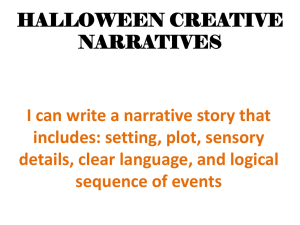Deconstructing A Prompt
advertisement
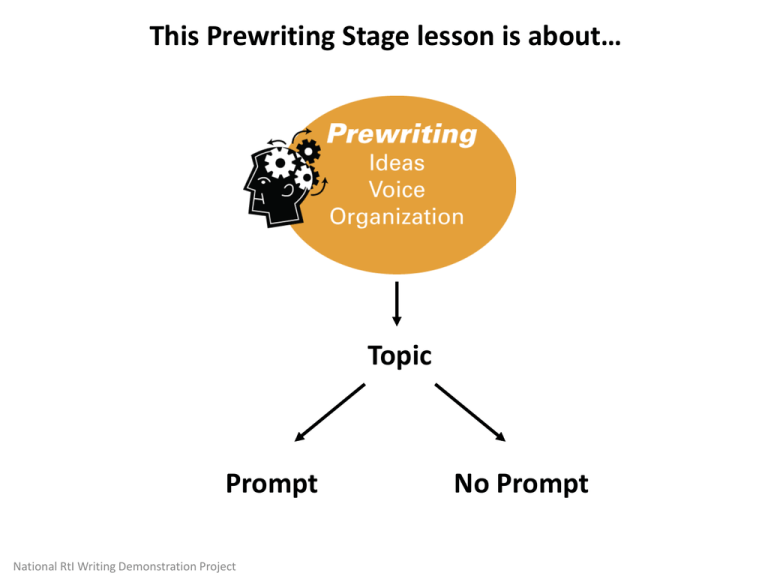
This Prewriting Stage lesson is about… Topic Prompt National RtI Writing Demonstration Project No Prompt What are you going to write about? PROMPT Sometimes you are given the topic or prompt. NO PROMPT Sometimes you might choose a topic. icon National RtI Writing Demonstration Project Let’s look at writing to a prompt… Topic Prompt National RtI Writing Demonstration Project What is a Prompt? Basically, a prompt is a question or an instruction that tells you what you're supposed to write. For example, a prompt might instruct you to write about… • a story you have read • your opinion on a topic • something you have experienced • a research topic National RtI Writing Demonstration Project Deconstructing a Prompt (constructing means to build) Deconstructing means to take apart How do I do that? To deconstruct a prompt: 1. Read it 2. Take it apart 3. Understand what you need to do 4. Determine how to respond to the prompt correctly National RtI Writing Demonstration Project Identifying Key Parts of a Written Prompt Does the prompt give you suggestions to get started? Hints • Pay careful attention to the wording of the prompt. • Look for suggestions in the prompt to get you started (ideas to think about, verbs that tell you what to do). • Use key words from the prompt to construct your thesis statement. National RtI Writing Demonstration Project Identifying Key Parts of a Written Prompt You can use the word RAFTS to help you remember how to deconstruct a prompt. What role do you take as the writer? (student, citizen, expert) Role Who is your audience? (class, parent, teacher, friend) Audience What kind of response are you writing? Format (essay, letter, descriptive) What are the verbs in the prompt asking you to do? Task (advise your classmate, justify your opinion, explain why…) What are the key words that you need to include in your response? Strong key words Hint: Use these words to construct your thesis statement. Example of Deconstructing a Prompt Doing a Good Job Select a person you know who does a good job in his or her profession. This person may be an entertainer, an athlete, a character in a story, or simply a successful family member. Write a multi-paragraph essay describing why you think this individual is so good at his or her job. Include specific examples and details to support your response. What role do you take as the writer? (student, citizen, expert) Role I am writing this as a student. Who is your audience? (class, parent, teacher, friend) Audience My audience will be the teacher. What kind of response are you writing? Format I am writing a descriptive multi-paragraph essay. What are the verbs in the prompt asking you to do? Task Select a person, write an essay describing why he/she is good at his/her job, include examples and details What are the key words that you need to include in your response? Strong key words Profession, successful Your Turn Prompt: Lots of people try to give us advice—parents, friends, brothers or sisters, teachers, etc. Tell a true story about a time you were given or gave advice. Tell if the advice was followed or not and the results. Form Pairs Re-read the prompt and deconstruct it by writing your response for: Role Audience National RtI Writing Demonstration Project Format Task Strong Key Words Practice Writing Prompt Lots of people try to give us advice—parents, friends, brothers or sisters, teachers, etc. Tell a true story about a time you were given or gave advice. Tell if the advice was followed or not and the results. Role Audience Format Task Strong key words The most important prewriting activity is to think about what you are going to write about. Good writing is about… • Clarifying the topic/deconstructing the prompt • Identifying strong feelings about the topic • Forming an opinion about the topic icon National RtI Writing Demonstration Project Writing to a Prompt Review Write one to two complete sentences describing how you deconstruct a prompt. Read your sentences to a partner. National RtI Writing Demonstration Project

